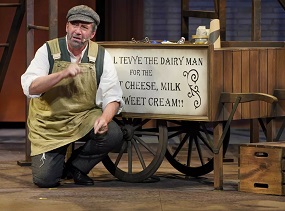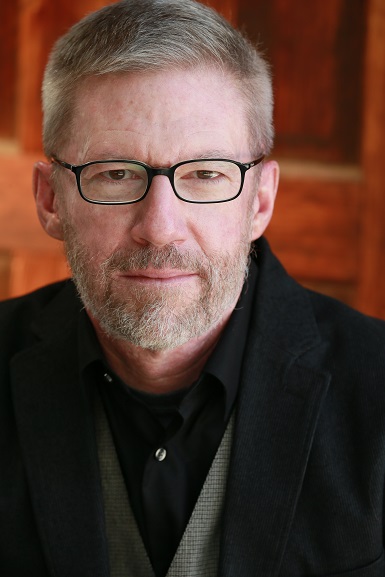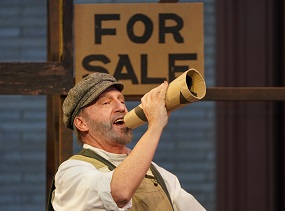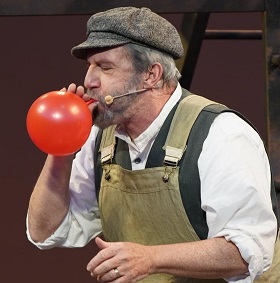
Tom Dugan in the one-man show Tevye in New York! at The Delray Beach Playhouse. Photo by Lawrence K. Ho
By Aaron Krause
A patriotic feeling envelops you as you hear Tevye the Dairyman talk about his share of the American Dream over the strains of The Stars and Stripes Forever. After all, Tevye is such a nice, charming and pious guy, you can’t help but feel good for the man.
Tevye and the…American Dream? Why, yes, don’t you know what became of Tevye after a pogrom forced him, his family, and fellow villagers from Anatevka in Imperial Russia circa 1905? He and his family ended up on the Lower East Side of Manhattan with a chance to make a new life for themselves. At least, that’s what happens in actor and playwright Tom Dugan’s heartwarming, moving, and amusing roughly 85-minute, intermission-less one-man show, Tevye in New York!
The play, which premiered in 2021 in California, is running through Jan. 7 in an energetic and believable production at The Delray Beach Playhouse. The offering is part of the playhouse’s Off-Broadway Series.

Tom Dugan in the one-man show Tevye in New York! at The Delray Beach Playhouse. Photo by Lawrence K. Ho
Dugan, who wrote and stars in the show, disappears into the role of Tevye, a part he played in Fiddler on the Roof when he was in high school in 1978.
JP Hubbell smartly directs the production by moving Dugan around the stage and thus ensuring that the actor never becomes a talking head. Hubbell’s direction also includes pauses with impact and the director gives Dugan actions to perform while he speaks. This enhances the naturalness and spontaneity of the performance. In addition, Hubbell obviously knows what to emphasize and when. And the pacing is just right.
Meanwhile, Dugan is a natural storyteller. While watching him, it’s easy to be impressed at his ability to address strangers as though they are his long-time friends. Throughout the performance, he develops that depth of rapport with audience members. In fact, sometimes he eyeballs one or more patrons as though he were addressing just them.

Tom Dugan in the one-man show Tevye in New York! at The Delray Beach Playhouse. Photo by Lawrence K. Ho
The actor, with wide dark eyes and grey hair, nails Tevye’s charm, easy-going nature and humor. For instance, his deadpan expression carries just the right effect. But Dugan is equally effective when conveying more serious expressions such as exasperation and emotional intensity. Wisely, he punctuates certain remarks with appropriate gestures such as shaking a finger or fist.
Dugan, whom you might remember from his one-man show, Wiesenthal, about Nazi hunter Simon Wiesenthal, appears in this play wearing period clothing by an uncredited costume designer. And he performs on a realistic period set designed by Cindi Taylor. It includes a multi-story, modest red brick building that serves as Tevye’s home and business. Nearby, a realistic street sign places us at the intersection of Orchard and Delancey Streets. A real-looking tree and period telephone also comprise the effective set, which an uncredited lightening designer illuminates. The lighting is multi-colored, perhaps reinforcing the fact that America at the time was a melting pot of diversity.
Dugan took inspiration for Tevye in New York! from Fiddler in addition to several of Sholem Aleichem’s short stories. By the way, Aleichem (1859-1916), known as the “Jewish Mark Twain,” was a Yiddish author and playwright whose stories inspired Fiddler on the Roof.
In fact, South Florida theatergoers have a rare opportunity to experience Dugan’s play, a sort of sequel to Fiddler, followed by the Wick Theatre’s upcoming production of Fiddler from Jan. 11-Feb. 11.

Tom Dugan in the one-man show Tevye in New York! at The Delray Beach Playhouse. Photo by Lawrence K. Ho
Tevye in New York! will make you fall in love with the titular character all over again as you experience his warmth, wit, and unbreakable spirit on the streets of the Lower East Side of Manhattan in 1914.
When the play opens, it is the Fourth of July, and Tevye has been living in New York for about five years. He just became a U.S. citizen.
Now, on the Fourth, Tevye is outside waiting for an Independence Day Parade to pass by his home and future business on the corner of Orchard and Delancey Streets. While he waits, he figures he may as well talk to us, the audience, since he is a talkative person. And, so, he updates us about him and his family and recounts his past.
But Tevye in New York! is not just a rehashing of Fiddler. We learn things in this play that we didn’t find out in the musical. For instance, Tevye was a woodcutter before he decided to become a dairyman. In addition, Tevye takes us as far back as his childhood, when a witch-like woman with one evil eye may have started his string of bad luck. We also learn more about Tevye’s younger daughters, whom librettist Joseph Stein did not prominently feature in Fiddler.
While Tevye in New York! offers us a different experience than what we encounter in the musical, Dugan will surely delight the Fiddler faithful. That is because Dugan includes plenty of references from Fiddler. For instance, at least one sentence from Tevye in New York! begins with the words, “You may ask,” calling to mind the character’s use of those words in Fiddler. At another point, Tevye tells us, “If I were a rich man…oh never mind.”
While Tevye may yet realize his dream of becoming rich, his string of sorrow has not ended with his arrival in New York. For example, back in the “Old Country” (Russia) one of his younger daughters essentially died of a broken heart after the man she wanted to marry turned her down. Also, we learn that Tevye’s beloved wife, Golde, also died after the death of her young daughter. We sense that she also succumbed to a broken heart. But Tevye and his surviving family members endured, proving that while you can break their heart, you cannot easily crush their spirit. In fact, he and one of his younger daughters, Abel, survived a long train ride to Belgium, where they hopped on a ship bound for New York.
Once they arrived at Ellis Island, they not only reached American soil but found resources that could help immigrants such as them make a new life for themselves.
“The theme of this year’s parade honors ‘New York’s immigrants’” Tevye tells us. “Well, what do you know? That’s us. I will tell you my immigrant story, we all have one.”
Indeed, we do, and that’s part of what endears us to tales such as Tevye in New York! And today, with migrants crossing the U.S. border in record numbers and fleeing the war-torn Middle East, stories about immigrants are particularly timely.
Tevye in New York! also reminds us about what has helped make America great all these years.
“This is the United States of America and all speech is free!” Tevye says. Then again, it’s hard not to wince after hearing such a remark. Indeed, today, when censorship is happening with frightening regularity and other forms of freedom are threatened, you find yourself aching for what this country at least used to be. Undoubtedly, you have to wonder whether Tevye’s future would look as rosy if he lived in modern times and just entered the country.
Fortunately, for a little less than 90 minutes, we can travel back in time and experience optimism after Tevye unveils a big announcement involving him and his family. The revelation is not the only surprise that Dugan has in store for us toward the end of the play. We’ll just say that the play includes delightful metatheatrical moments and references.
Tevye in New York! isn’t perfect. Specifically, it includes some unnecessary repetition, and some parts are hard to believe. For instance, why would Tevye remove the markers from Golde and his young daughter’s graves before coming to America? Also, Tevye mentions his daughter, Chava, to us, when you might think he wouldn’t name her. Atter all, she married out of the Jewish faith, and so, in Fiddler, Chava was dead to him.
Some of the attempts at humor in Dugan’s play are more awkward than others, although chances are you will at least chuckle while experiencing Tevye in New York!
While Dugan’s play can make us think about topics such as freedom, immigration and the American Dream, it is mostly an escapist piece that gives us a brief respite from our troubled world in 2023. And without question, it will whet your appetite for the Wick’s production of Fiddler on the Roof.
The Delray Beach Playhouse’s production of Tevye in New York! continues through Jan. 7. For showtimes and ticket prices, go to Tevye in New York – Delray Beach Playhouse. The playhouse is located at 950 N.W. 9th St. in Delray Beach, 561-272-1281.561-272-1281









 A PaperStreet Web Design
A PaperStreet Web Design
